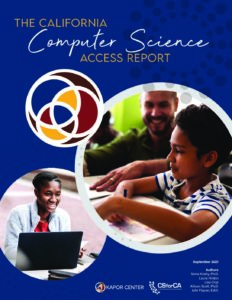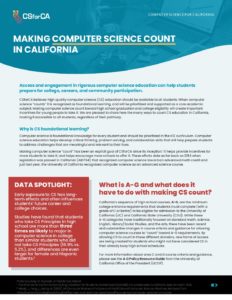The California Computer Science Access Report
This report examines computer science education in California—who has access, who participates, and where equity gaps by race, gender, income, and geography continue to persist.

This report examines computer science education in California—who has access, who participates, and where equity gaps by race, gender, income, and geography continue to persist.

For District Leaders, Principals, Teachers, and CS Advocates interested in increasing CS opportunities for all students. This guide, developed by administrators across the state of California, is intended to inform education leaders about how to bring equitable CS into their schools.

When computer science “counts” it is recognized as foundational learning, and will be prioritized and supported as a core academic subject. Download our brief on the many ways that computer science counts in California, and can be integrated into other subjects.
At the 2024 STEAM Symposium and CABE conference, CSforCA leaders Paula Nazario and Roxana Hadad presented on the importance of family engagement in CS education.
This case study explores how the Santa Barbara County Education Office (SBCEO) organized a professional learning network to support district leadership to implement the newly adopted Computer Science Standards in an equitable manner.
This peer-reviewed research article published in the Journal of Computer Science Integration examines best practices for professional development resources to support educational leaders in implementing equitable computer science.
What exactly is computer science? This infographic explores what computer science is, and the importance of giving students of all backgrounds the opportunity to learn and pursue it.
A new report from CSforCA and Kapor Center that analyzes K-12 computer science education in California, revealing significant disparities by race/ethnicity, gender, socioeconomic status, and geography of California students who have access to, enroll in and succeed in computer science courses.
Computer science (CS) education has the power to shape the futures of California’s students, our economy, as well as our society at large. However, systemic and historic inequities embedded within our education system impact the patterns of who participates in CS education.